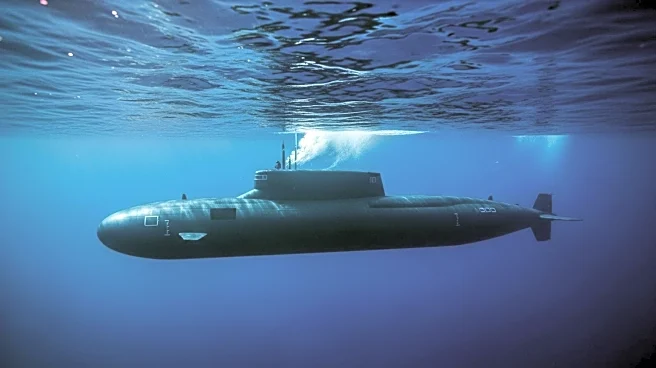What's Happening?
Recent satellite imagery has captured significant activity by Russia's submarine fleet in the Far East region, highlighting Moscow's ongoing military presence despite its involvement in the Ukraine conflict. The images, shared by open-source intelligence analyst @MT_Anderson, show five Russian submarines of four different types at a shipyard in Bolshoy Kamen, near Vladivostok. These include a Yasen-M-class cruise missile submarine, a Borei-class ballistic missile submarine, an Oscar II-class cruise missile submarine, and two Akula-class attack submarines. The Borei-class submarine, capable of carrying nuclear missiles, was recently spotted near Japan's Hokkaido Island. This development underscores Russia's commitment to expanding its fleet of nuclear-powered submarines, a strategic move emphasized by President Vladimir Putin as essential for national security.
Why It's Important?
The activity of Russia's Pacific Fleet submarines is significant as it reflects the country's strategic military posture in the region, which is crucial for maintaining its national security and interests. The deployment of nuclear-powered submarines in the Pacific is a direct response to the United States' military presence in the area, aimed at deterring aggression. This development poses a security concern for neighboring countries like Japan, which has noted Russia's active military activities in its defense white paper. The strategic partnership between Russia and China further complicates the security dynamics in the Indo-Pacific region, potentially affecting U.S.-led alliances with Japan and South Korea.
What's Next?
The future implications of Russia's submarine activity in the Pacific remain uncertain. It is yet to be seen if Russia will deploy additional naval vessels to strengthen its Pacific Fleet, potentially countering U.S. alliances in the region. The ongoing military developments could lead to increased tensions and necessitate diplomatic engagements among the involved nations to address security concerns. Monitoring of the situation by international observers and governments will likely continue, as the strategic balance in the Indo-Pacific region evolves.
Beyond the Headlines
The expansion of Russia's submarine fleet in the Pacific could have long-term implications for global naval power dynamics. It highlights the importance of nuclear deterrence and the role of advanced military technology in securing national interests. The strategic partnership between Russia and China may influence regional security policies and alliances, prompting shifts in military strategies among other nations. This development also raises ethical considerations regarding the proliferation of nuclear capabilities and the potential risks associated with increased military activities in sensitive regions.










